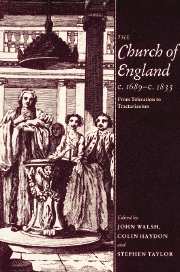Book contents
- Frontmatter
- Contents
- Preface
- List of Abbreviations
- 1 Introduction: The Church and Anglicanism in the ‘long’ eighteenth century
- Part I The pastoral work of the Church
- 2 The eighteenth-century Reformation: the pastoral task of Anglican clergy after 1689
- 3 The clergy in the diocese of London in the eighteenth century
- 4 The reception of Richard Podmore: Anglicanism in Saddleworth 1700–1830
- Part II Crisis and reform
- Part III Identities and perceptions
- Index
3 - The clergy in the diocese of London in the eighteenth century
Published online by Cambridge University Press: 13 October 2009
- Frontmatter
- Contents
- Preface
- List of Abbreviations
- 1 Introduction: The Church and Anglicanism in the ‘long’ eighteenth century
- Part I The pastoral work of the Church
- 2 The eighteenth-century Reformation: the pastoral task of Anglican clergy after 1689
- 3 The clergy in the diocese of London in the eighteenth century
- 4 The reception of Richard Podmore: Anglicanism in Saddleworth 1700–1830
- Part II Crisis and reform
- Part III Identities and perceptions
- Index
Summary
This essay attempts to reassess some long-held assumptions about the Church of England in the eighteenth century. A clerical living is often supposed to have been a career for the upper classes – indeed increasingly so – and furthermore the clergy are seen to have been complacent and neglectful of their pastoral task. However, eighteenth-century ecclesiastical history still remains under-researched, and a new perspective at a local level, that of the diocese of London, provides a different picture of the Church, both in the recruitment of its clergy and in its work in the parishes.
The status and the role of the clergy have lately been investigated by historians of the Reformation and of the early seventeenth century. They have stressed the crisis that followed the Reformation, when the Church started to appear as a career fit only for the sons of the comparatively humble, the menu peuple, thereby creating a shortage of personnel. The end of Elizabeth's reign brought about an improvement in the social status of the clergy, when some younger sons of the gentry and many sons of clergymen started to enter the Church. But the Civil War inflicted a further blow on their still uncertain respectability, and the Restoration Church could not become an attractive career. The early eighteenth century was a time of increasing difficulties, both for the Church as an institution, and for the clergy as a social and professional group; they felt themselves severely criticized by laymen, while their financial straits knew no improvement.
- Type
- Chapter
- Information
- The Church of England c.1689–c.1833From Toleration to Tractarianism, pp. 86 - 109Publisher: Cambridge University PressPrint publication year: 1993
- 1
- Cited by



